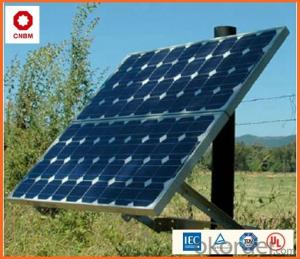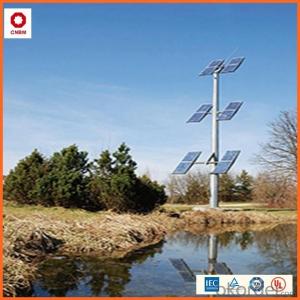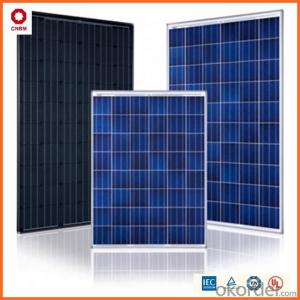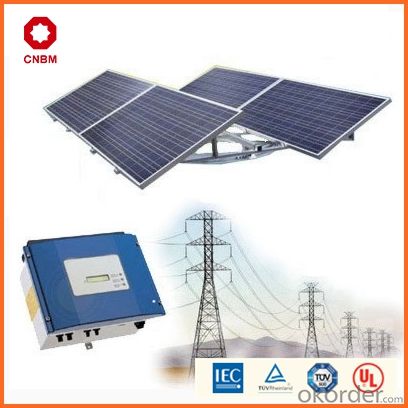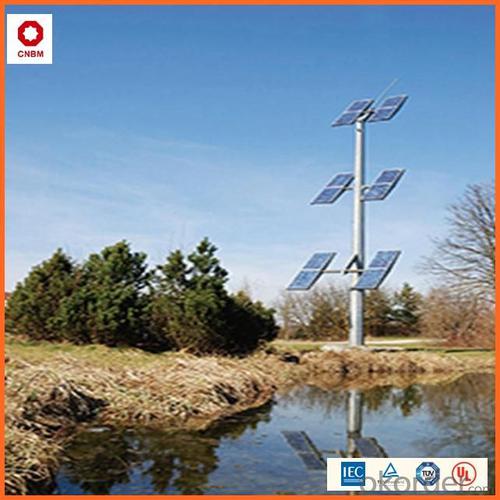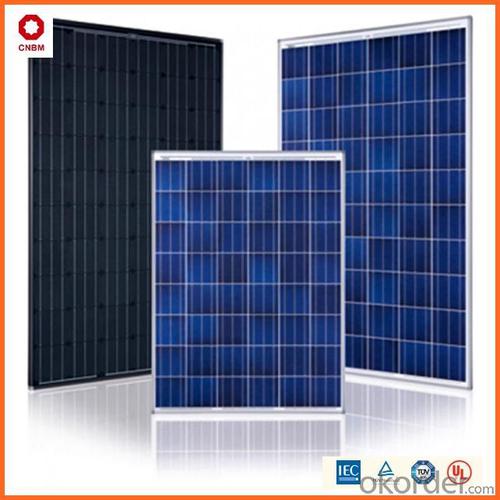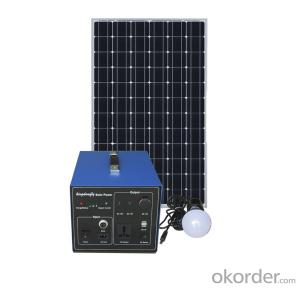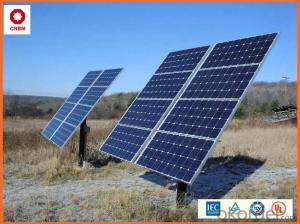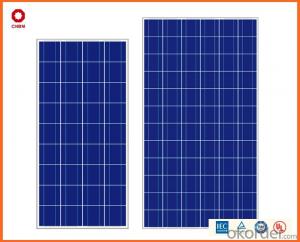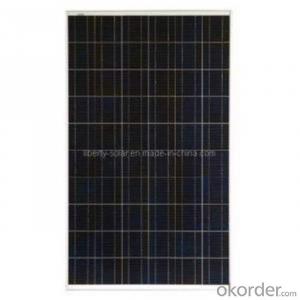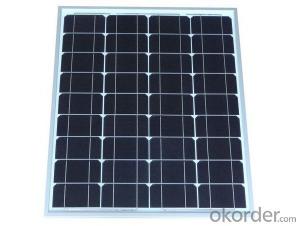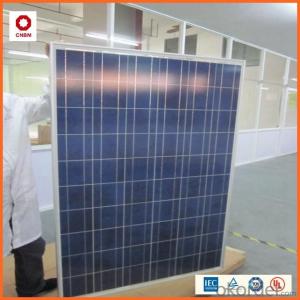85W Poly Off Grid Solar Energy Systems Small Solar Panel - Good Quality
- Loading Port:
- China main port
- Payment Terms:
- TT OR LC
- Min Order Qty:
- 1 watt
- Supply Capability:
- 10000000 watt/month
OKorder Service Pledge
OKorder Financial Service
You Might Also Like
Specification
Hot Sale !!! Quality and Safety of Small Poly Solar Panel 25~85w
1. Rigorous quality control meets the highest international standards.
2. High-transmissivity low-iron tempered glass, strong aluminium frame.
3. Using UV-resistant silicon.
4. IS09001/14001/CE/TUV/UL
Warranties of Small Poly Solar Panel 25~85w
1. 10 years limited product warranty
2. 15 years at 90% of the minimal rated power output
3. 25 years at 80% of the minimal rated power output
Specification
Characteristics of Poly solar panels CNBM (25-85W) | |||||
Max Power Voltage Vmp(V) | 30.3 | 30.8 | 31.1 | 31.4 | 31.85 |
Max Power Current Imp(A) | 7.60 | 7.64 | 7.73 | 7.81 | 7.85 |
Open Circuit Voltage Voc(V) | 36.1 | 36.6 | 37 | 37.3 | 37.68 |
Short Circuit Current Isc(A) | 8.50 | 8.55 | 8.65 | 8.75 | 8.85 |
Max Power Pm(W) | 230W | 235W | 240W | 245W | 250W |
Temperature Coefficient of Cells Poly solar panels CNBM (25-85W) | |
NOCT | 45± 2 |
Temperature Coeffucients of Isc | 0.0492 |
Temperature Coeffucients of Voc | -0.3374 |
Temperature Coeffucients of Voc | -0.4677 |
Mechanical Data of Poly solar panels CNBM (25-85W) | |
Dimension | 1638 × 982 × 40 mm |
Weight | 19.5 kg |
No. of Cells and Connections | 60 (6 ×10) |
Tolerance | 0 ~ + 5 W |
Cell | Monocrystalline Cell 156 × 156 mm |
Packing | 624 Pcs/40ft(H) Container |
Limits of Poly solar panels CNBM (25-85W) | |
Operating Temperature | -40 to +85 |
Storage Temperature | -40 to +85 |
Max System Voltage | 1000VDC(IEC) / 600VDC(UL) |
Features of our products:
• High conversion efficiency mono/poly-crystalline amorphous silicon solar cells
• Modules incorporate high performance bypass diodes to minimize the power drop caused by shading
• High transmittance, low-iron tempered glass
• High performance EVA encapsulant to prevent destroying and water.
• AI frame: without screw, corner connection. 8 holes on the frame can be installed easily
• Good performance of preventing from atrocious weather such as wind and hails
• Certifications: CE IEC TUV VDE UL, Class I
• 10 years 90% power output warranty

Shipping of Small Poly Solar Panel 25~85w
By Sea | Delivery from Shanghai or Ningbo seaport |
By Air | Departure from Shanghai Pudong Airport |
By Express | Post by DHL, EMS, UPS, TNT. |
- Q: Are there any environmental benefits of solar energy systems?
- Yes, there are numerous environmental benefits of solar energy systems. Firstly, solar energy is a clean and renewable energy source, meaning it does not emit greenhouse gases or other harmful pollutants into the atmosphere. This helps to reduce air pollution and combat climate change, as solar power generates electricity without any carbon emissions. Moreover, solar energy systems require minimal water usage compared to other traditional forms of energy generation, such as coal or natural gas power plants. This is particularly important in regions facing water scarcity or droughts, as solar power helps to conserve water resources. Additionally, solar energy systems help to reduce reliance on fossil fuels, which are finite resources and contribute to the depletion of natural resources. By generating electricity from sunlight, solar power reduces the need for extracting and burning fossil fuels, conserving these valuable resources for future generations. Furthermore, solar energy systems can be installed on rooftops or in open areas, minimizing the need for large-scale land clearance or habitat destruction. This helps to protect ecosystems and preserve biodiversity. Overall, solar energy systems offer significant environmental benefits by reducing greenhouse gas emissions, conserving water resources, minimizing reliance on fossil fuels, and preserving ecosystems. By transitioning to solar power, we can contribute to a cleaner, more sustainable future for our planet.
- Q: Can solar energy systems be installed on roadways?
- Yes, solar energy systems can be installed on roadways. Solar roadways, also known as solar panels or solar tiles installed on roads, have been developed to generate electricity from sunlight. These systems have the potential to harness solar energy and convert it into usable electricity, helping to power streetlights, traffic signals, and even nearby buildings. However, the practicality and efficiency of solar roadways are still being researched and tested.
- Q: Is it possible to store excess solar energy for later use?
- Yes, it is possible to store excess solar energy for later use. This can be done through various methods such as using batteries, pumped hydro storage, or converting the energy into hydrogen or other forms of fuel for later use.
- Q: Can solar energy systems be used for powering electric vehicle research and development centers?
- Yes, solar energy systems can be used to power electric vehicle research and development centers. Solar panels can generate electricity from sunlight, which can be used to power the facilities and provide a sustainable and renewable energy source for the centers' operations. This can greatly contribute to reducing carbon emissions and promoting green and clean energy practices in the electric vehicle industry.
- Q: Can solar energy systems be used in areas with high snowfall?
- Yes, solar energy systems can be used in areas with high snowfall. While snow can temporarily reduce the efficiency of solar panels, it does not completely hinder their functionality. Additionally, the panels are typically installed at an angle that allows snow to slide off, and advancements in technology have made them more resistant to snow accumulation. Regular maintenance, such as clearing snow off the panels, can ensure optimal performance in snowy conditions.
- Q: Can solar energy systems be used in powering music studios or recording studios?
- Yes, solar energy systems can definitely be used to power music studios or recording studios. Solar power systems are a clean and renewable energy source that can provide a reliable and cost-effective solution for powering various electrical equipment, including the high energy-consuming equipment found in music studios. Solar panels can be installed on the roof or any other suitable area of the studio building to harness sunlight and convert it into electricity. This electricity can then be used to power a wide range of equipment such as amplifiers, mixers, microphones, computers, lighting, and air conditioning systems. The size of the solar power system required will depend on the energy needs of the studio. By analyzing the energy consumption patterns and demands of the studio, solar energy experts can design and install a customized solar power system to meet the specific requirements of the studio. One of the advantages of using solar energy in music studios is the potential for significant cost savings. Traditional electricity sources, especially in commercial settings, can be quite expensive. By generating their own electricity through solar power, studios can reduce their reliance on the grid and potentially lower their electricity bills. Additionally, solar energy is a sustainable and environmentally friendly option. Music studios often consume a large amount of electricity, and using solar power can help reduce their carbon footprint and contribute to a greener future. It is worth noting that solar energy systems can also be combined with battery storage systems. This allows music studios to store excess energy produced during the day and use it during times of low solar generation or at night. This further enhances the reliability and independence of the solar power system. In conclusion, solar energy systems can be effectively used to power music studios or recording studios. They offer a clean, renewable, and cost-effective solution that can meet the energy demands of these facilities while reducing their environmental impact.
- Q: Can solar energy systems be used for powering air conditioning systems?
- Yes, solar energy systems can be used for powering air conditioning systems. Solar-powered air conditioning systems, also known as solar air conditioners, utilize the sun's energy to power the cooling process. These systems typically consist of solar panels that capture sunlight and convert it into electricity, which is then used to run the air conditioning unit. By using solar energy, these systems offer a sustainable and environmentally-friendly alternative to conventional air conditioning systems that rely on fossil fuels. Solar air conditioners are particularly beneficial in areas with abundant sunlight, as they can significantly reduce energy costs and dependency on the electrical grid.
- Q: Can solar energy systems be used for powering electric vehicle solar charging stations at airports?
- Yes, solar energy systems can be used to power electric vehicle solar charging stations at airports. Solar panels can be installed on the roofs or nearby areas of airports to collect sunlight and convert it into electricity. This clean and renewable energy can then be used to charge electric vehicles at designated charging stations, reducing the reliance on fossil fuels and lowering carbon emissions. Additionally, airports often have ample space for solar panel installations, making it an ideal location for such charging stations.
- Q: Can solar energy systems be used in areas with limited resources?
- Yes, solar energy systems can be used in areas with limited resources. Solar power is a renewable energy source that requires no fuel and can be harnessed using simple technologies. It can be particularly beneficial in areas with limited access to traditional energy sources, such as remote regions or developing countries. Solar energy systems can provide electricity for basic needs like lighting, cooking, and powering small appliances, improving the quality of life and promoting sustainable development in resource-constrained areas.
- Q: Are there any risks of electrical malfunctions or failures during extreme weather events with solar energy systems?
- Yes, there are some risks of electrical malfunctions or failures during extreme weather events with solar energy systems. Severe weather conditions such as hurricanes, tornadoes, hailstorms, or heavy snowfall can potentially damage solar panels, inverters, or electrical wiring, leading to system failures. Additionally, lightning strikes can pose a risk to solar energy systems, potentially causing damage or complete failure. However, proper installation, regular maintenance, and adhering to industry standards can help mitigate these risks and ensure the resilience of solar energy systems during extreme weather events.
Send your message to us
85W Poly Off Grid Solar Energy Systems Small Solar Panel - Good Quality
- Loading Port:
- China main port
- Payment Terms:
- TT OR LC
- Min Order Qty:
- 1 watt
- Supply Capability:
- 10000000 watt/month
OKorder Service Pledge
OKorder Financial Service
Similar products
Hot products
Hot Searches
Related keywords
